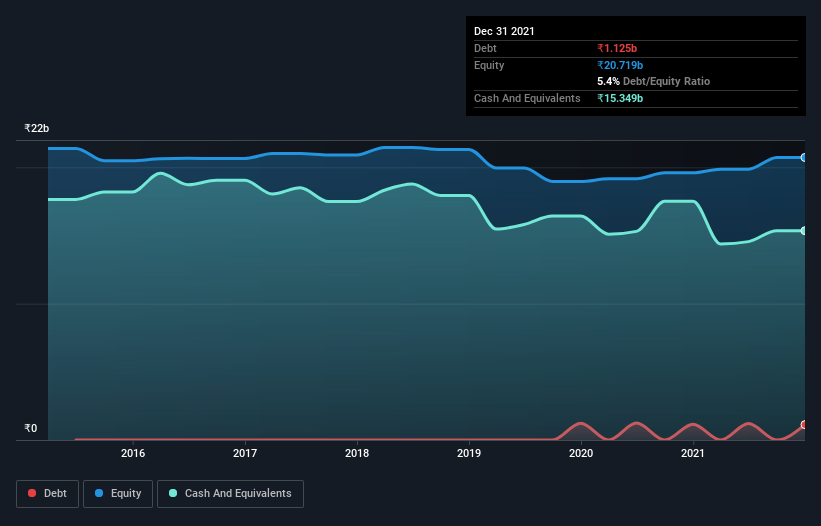
Legendary fund manager Li Lu (who Charlie Munger backed) once said, 'The biggest investment risk is not the volatility of prices, but whether you will suffer a permanent loss of capital.' When we think about how risky a company is, we always like to look at its use of debt, since debt overload can lead to ruin. Importantly, KIOCL Limited (NSE:KIOCL) does carry debt. But is this debt a concern to shareholders?
When Is Debt A Problem?
Debt and other liabilities become risky for a business when it cannot easily fulfill those obligations, either with free cash flow or by raising capital at an attractive price. In the worst case scenario, a company can go bankrupt if it cannot pay its creditors. However, a more common (but still painful) scenario is that it has to raise new equity capital at a low price, thus permanently diluting shareholders. By replacing dilution, though, debt can be an extremely good tool for businesses that need capital to invest in growth at high rates of return. When we think about a company's use of debt, we first look at cash and debt together.
Check out our latest analysis for KIOCL
What Is KIOCL's Debt?
The chart below, which you can click on for greater detail, shows that KIOCL had ₹1.13b in debt in September 2021; about the same as the year before. However, its balance sheet shows it holds ₹15.3b in cash, so it actually has ₹14.2b net cash.

How Strong Is KIOCL's Balance Sheet?
The latest balance sheet data shows that KIOCL had liabilities of ₹4.10b due within a year, and liabilities of ₹1.98b falling due after that. Offsetting this, it had ₹15.3b in cash and ₹143.4m in receivables that were due within 12 months. So it actually has ₹9.41b more liquid assets than total liabilities.
This short term liquidity is a sign that KIOCL could probably pay off its debt with ease, as its balance sheet is far from stretched. Simply put, the fact that KIOCL has more cash than debt is arguably a good indication that it can manage its debt safely.
Even more impressive was the fact that KIOCL grew its EBIT by 340% over twelve months. If maintained that growth will make the debt even more manageable in the years ahead. When analysing debt levels, the balance sheet is the obvious place to start. But it is KIOCL's earnings that will influence how the balance sheet holds up in the future. So when considering debt, it's definitely worth looking at the earnings trend. Click here for an interactive snapshot.
Finally, while the tax-man may adore accounting profits, lenders only accept cold hard cash. While KIOCL has net cash on its balance sheet, it's still worth taking a look at its ability to convert earnings before interest and tax (EBIT) to free cash flow, to help us understand how quickly it is building (or eroding) that cash balance. Considering the last three years, KIOCL actually recorded a cash outflow, overall. Debt is far more risky for companies with unreliable free cash flow, so shareholders should be hoping that the past expenditure will produce free cash flow in the future.
Summing up
While it is always sensible to investigate a company's debt, in this case KIOCL has ₹14.2b in net cash and a decent-looking balance sheet. And we liked the look of last year's 340% year-on-year EBIT growth. So we don't have any problem with KIOCL's use of debt. The balance sheet is clearly the area to focus on when you are analysing debt. However, not all investment risk resides within the balance sheet - far from it. For example, we've discovered 1 warning sign for KIOCL that you should be aware of before investing here.
Of course, if you're the type of investor who prefers buying stocks without the burden of debt, then don't hesitate to discover our exclusive list of net cash growth stocks, today.
Valuation is complex, but we're here to simplify it.
Discover if KIOCL might be undervalued or overvalued with our detailed analysis, featuring fair value estimates, potential risks, dividends, insider trades, and its financial condition.
Access Free AnalysisHave feedback on this article? Concerned about the content? Get in touch with us directly. Alternatively, email editorial-team (at) simplywallst.com.
This article by Simply Wall St is general in nature. We provide commentary based on historical data and analyst forecasts only using an unbiased methodology and our articles are not intended to be financial advice. It does not constitute a recommendation to buy or sell any stock, and does not take account of your objectives, or your financial situation. We aim to bring you long-term focused analysis driven by fundamental data. Note that our analysis may not factor in the latest price-sensitive company announcements or qualitative material. Simply Wall St has no position in any stocks mentioned.
About NSEI:KIOCL
KIOCL
Engages in the iron ore mining, beneficiation, and production of pellets in India and internationally.
Adequate balance sheet very low.

